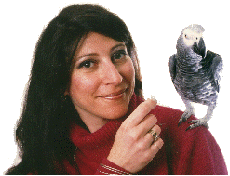Alex, Love and Language

I'm going to start with a recent news story.
The New York Times' obituary for Alex the parrot ends with this touching account of his last words (Benedict Carey, "Alex, a Parrot Who Had a Way With Words, Dies", NYT, 9/10/2007):
Even up through last week, Alex was working with Dr. Pepperberg on compound words and hard-to-pronounce words. As she put him into his cage for the night last Thursday, Alex looked at her and said: "You be good, see you tomorrow. I love you."
He was found dead in his cage the next morning, and was determined to have died late Thursday night.
A couple of days later, Verlyn Klinkenborg took up the philosophical implications of this account (" Alex the Parrot", NYT, 9/12/2007):
What you make of Dr. Irene Pepperberg’s work with Alex depends on whether you think Alex’s cognitive presence was real or merely imitative. [...]
These are bottomless questions, of course. For us, language is everything because we know ourselves in it. Alex’s final words were: “I love you.”
There is no doubt that Alex had a keen awareness of the situations in which that sentence is appropriate — that is, at the end of a message at the end of the day. But to say whether Alex loved the human who taught him, we’d have to know if he had a separate conceptual grasp of what love is, which is different from understanding the context in which the word occurs. By any performative standard — knowing how to use the word properly — Alex loved Dr. Pepperberg.
Beyond that, only our intuitions, our sense of who that bird might really be, are useful. And in some ways this is also a judgment we make about loving each other.
To wonder what Alex recognized when he recognized words is also to wonder what humans recognize when we recognize words.
Klinkenborg is concerned about whether Alex meant what he said -- but this seems to me to be the wrong question, at least from the perspective of cognitive science. Surely Alex loved Irene -- it seems no more of a stretch to call a pet parrot's bond with its owner "love" than to call its desire for food "hunger".
What's the real question? Well, at one level, there's the simple factual matter of who made what sounds in that last exchange. The Boston Globe told a different story:
John C. Drake, "Death of gifted parrot stuns scientists", Boston Globe, 9/11/2007
The vet did determine that Alex died shortly after Pepperberg had left the bird for the night Thursday.
Pepperberg said she and Alex went through their good-night routine, in which she told him it was time to go in the cage and said: "You be good. I love you. I'll see you tomorrow." To which Alex said, "You'll be in tomorrow."
And searching Google News for other versions will turn up several other versions of the legend, for example this one ("Bird Brain Dies After Years of Research", AP, 9/12/2007):
The last time Pepperberg saw Alex was Thursday, she said. They went through their back-and-forth goodnight routine, which always varied slightly and in which she told him it was time to go in the cage.
She recalls the bird said: "You be good. I love you." She responded, "I love you, too." The bird said, "You'll be in tomorrow," and she responded, "Yes, I'll be in tomorrow."
Isn't this is a matter for historians and anthropologists studying myth formation? Why is this relevant to a phonetician and a roboticist?
From my perspective, the essential thing is that all the accounts of Alex's last words share the idea that some intersubjectively stable string of symbols was exchanged. The different accounts disagree about what his parting phrases were -- but they all agree in describing what happened as an exchange, not just of time-varying noises in a certain frequency range, but of specific, discrete lexical tokens.
To see the real scientific interest of this fact, let's go back to 1951.